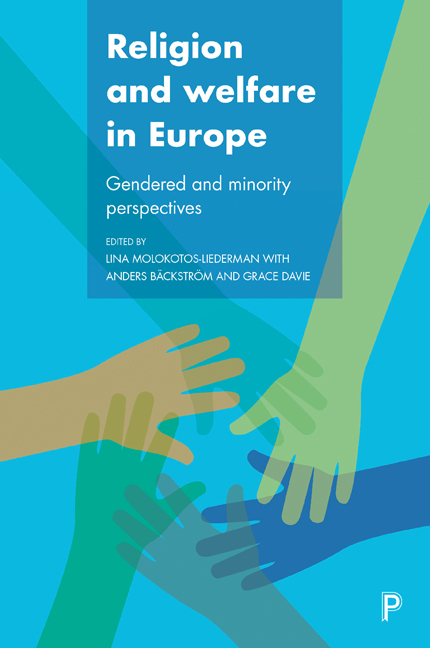Book contents
- Frontmatter
- Contents
- List of tables, figures and maps
- Acknowledgements
- Notes on contributors
- one Introduction
- Part One Thinking methodologically: approaches to research and practice
- Part Two Thinking regionally: key case studies in welfare and religion in Europe
- Part Three Gendered and minority perspectives
- Part Four Drawing the threads together
- Appendix: the WaVE team
- Index
Four - Social cohesion: from research to practice
Published online by Cambridge University Press: 05 April 2022
- Frontmatter
- Contents
- List of tables, figures and maps
- Acknowledgements
- Notes on contributors
- one Introduction
- Part One Thinking methodologically: approaches to research and practice
- Part Two Thinking regionally: key case studies in welfare and religion in Europe
- Part Three Gendered and minority perspectives
- Part Four Drawing the threads together
- Appendix: the WaVE team
- Index
Summary
Introduction
In this chapter, we explore the theory and practice of social cohesion in relation to the policy recommendations that were drawn from the findings of the Welfare and Values in Europe: Transitions Related to Religion, Minorities and Gender (WaVE) project. We also discuss how the concept of social cohesion is used in politics and social science more generally, noting the discursive contexts in which it appears. Finally, we use this concept as an analytical tool in our discussion of the policy recommendations that came out of WaVE. We develop our analysis in the context of the circle of cohesion in European localities.
The WaVE project was developed in response to a European Commission call for research to explore how religion is at one and the same time a bearer of solidarity, cohesion and tolerance on the one hand, and of tension, discrimination and xenophobia on the other. It also aimed to gain insight into how societies can ensure the peaceful coexistence of different value systems. How in other words do different European countries address these issues through policies and practices and what is their relative success in so doing?
It is important to note that the concept of social cohesion was not explicitly defined in the WaVE project, thus enabling researchers and participants to approach the values of solidarity, tolerance and cohesion implicitly and in a non-specific, or intuitive way. The outcome was a wide variety of interpretations of the relationships in question. In this chapter, we take a step forward, getting to grips with the meaning or rather meanings of social cohesion, especially its uses in politics and social science. We also reflect on the ways in which the concept so defined can be used to illuminate the findings from the WaVE project.
The concept of social cohesion
Social cohesion in social science and political discourse
The term ‘social cohesion’ has become widely used over the past decade or so, referring to various types of phenomena, both economic and social. It is associated with different forms of capital, values and ethics. Nevertheless, in many cases its meaning appears rather vague, even in social science publications.
- Type
- Chapter
- Information
- Religion and Welfare in EuropeGendered and Minority Perspectives, pp. 53 - 74Publisher: Bristol University PressPrint publication year: 2017



